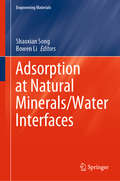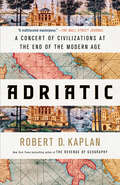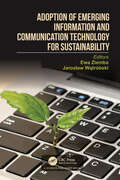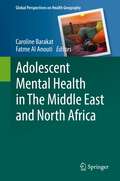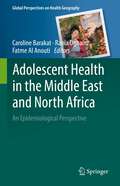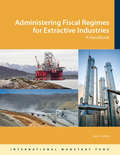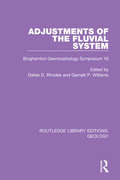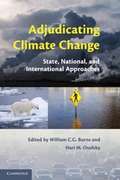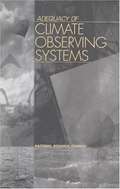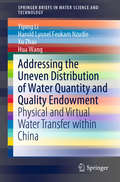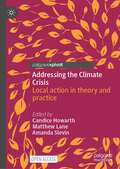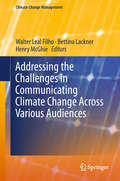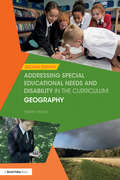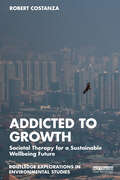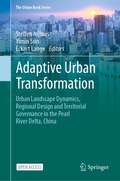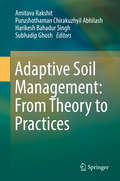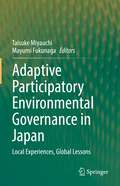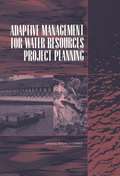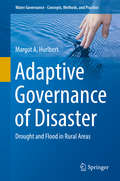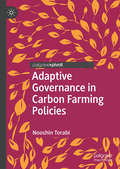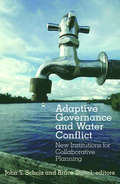- Table View
- List View
Adsorption at Natural Minerals/Water Interfaces (Engineering Materials)
by Shaoxian Song Bowen LiThis book introduces the latest research regarding the adsorption of heavy metals, toxic ions, and organic compounds at the interfaces of water/minerals, such as mineralogical characterizations, surface chemistry, and modification of natural minerals as adsorbents, as well as the adsorption of cations, anions, and organic compounds in water. Presenting findings by the authors and their co-workers, the book helps readers grasp the principals and benefits of using minerals for water treatment, as well as the advanced technologies in the area developed over last 30 years, especially the last 10 years.
Adriatic: A Concert of Civilizations at the End of the Modern Age
by Robert D. Kaplan&“[An] elegantly layered exploration of Europe&’s past and future . . . a multifaceted masterpiece.&”—The Wall Street Journal&“A lovely, personal journey around the Adriatic, in which Robert Kaplan revisits places and peoples he first encountered decades ago.&”—Peter Frankopan, author of The Silk RoadsIn this insightful travelogue, Robert D. Kaplan, geopolitical expert and bestselling author of Balkan Ghosts and The Revenge of Geography, turns his perceptive eye to a region that for centuries has been a meeting point of cultures, trade, and ideas. He undertakes a journey around the Adriatic Sea, through Italy, Slovenia, Croatia, Montenegro, Albania, and Greece, to reveal that far more is happening in the region than most news stories let on. Often overlooked, the Adriatic is in fact at the center of the most significant challenges of our time, including the rise of populist politics, the refugee crisis, and battles over the control of energy resources. And it is once again becoming a global trading hub that will determine Europe&’s relationship with the rest of the world as China and Russia compete for dominance in its ports. Kaplan explores how the region has changed over his three decades of observing it as a journalist. He finds that to understand both the historical and contemporary Adriatic is to gain a window on the future of Europe as a whole, and he unearths a stark truth: The era of populism is an epiphenomenon—a symptom of the age of nationalism coming to an end. Instead, the continent is returning to alignments of the early modern era as distinctions between East and West meet and break down within the Adriatic countries and ultimately throughout Europe. With a brilliant cross-pollination of history, literature, art, architecture, and current events, in Adriatic, Kaplan demonstrates that this unique region that exists at the intersection of civilizations holds revelatory truths for the future of global affairs.
Adoption of Emerging Information and Communication Technology for Sustainability
by Ewa Ziemba JarosławThis book represents an important voice in the discourse on the adoption of emerging ICT for sustainability. It focuses on how emerging ICT acts as a crucial enabler of sustainability, offering new forward-looking approaches to this field. The book explores how emerging ICT adoption drives sustainability efforts in business and public organizations, promoting ecological, economic, social, cultural, and political sustainability. The book's theoretical discussions, conceptual approaches, empirical studies, diverse perspectives, and views make it a valuable and comprehensive reference work. Appealing to both researchers and practitioners, this book provides significant areas for research and practice related to the contribution of emerging ICT adoption to sustainability. It also suggests vital considerations for programming and building sustainable development-driven emerging ICT adoption. Readers will find answers to important contemporary questions, such as: What are the concepts, frameworks, models, and approaches to enhance sustainable development through the adoption of emerging ICT? How does the adoption of emerging ICT influence sustainability? How can emerging ICT be adopted to enhance sustainability? What are the current practices and successful cases of emerging ICT adoption for sustainability? What factors influence emerging ICT adoption to enhance sustainability?
Adolescent Mental Health in The Middle East and North Africa (Global Perspectives on Health Geography)
by Caroline Barakat Fatme Al AnoutiThis 2-volume set focuses on adolescent health in the Middle East and North Africa region (MENA), and presents the latest research on the health risk behaviours and social behaviours that adolescents from the MENA region engage in. While there has been a surge in peer-reviewed research publications on population health in the MENA region in the last couple of decades, very few books offer a resource to address the diverse negative influences that disproportionately affect adolescents and children in the MENA region, including increased tobacco consumption culture, low emphasis on physical activity, increased sedentary behaviours, weak health policies, and societal issues related to displacement and political conflicts. These books offer a synthesis of current knowledge on adolescent health issues in the MENA region, and aim to provide evidence-informed adolescent health care practices that address current issues related to mental, physical, reproductive and nutritional health. Volume 1 focuses on mental health in the MENA region, the development and implementation of youth friendly public policies, and how to strategize in the age of COVID-19. The study will aid health care professionals, policy makers, government organizations and health program planners to assess current policies and practices related to adolescent health in the MENA region, and to identify the best courses of action moving forward.
Adolescent Health in the Middle East and North Africa: An Epidemiological Perspective (Global Perspectives on Health Geography)
by Caroline Barakat Rania Dghaim Fatme Al AnoutiThis 2-volumeset focuses on adolescent health in the Middle East and North Africa region (MENA), and presents the latest research on the health risk behaviours and social behaviours that adolescents from the MENA region engage in. While there has been a surge in peer-reviewed research publications on population health in the MENA region in the last couple of decades, very few books offer a resource to address the diverse negative influences that disproportionately affect adolescents and children in the MENA region, including increased tobacco consumption culture, low emphasis on physical activity, increased sedentary behaviours, weak health policies, and societal issues related to displacement and political conflicts. These books offer a synthesis of current knowledge on adolescent health issues in the MENA region, and aim to provide evidence-informed adolescent health care practices that address current issues related to mental, physical, reproductive and nutritional health. Volume 2 focuses on nutritional and reproductive health in the MENA region, predictive modelling of obesity, determinants of sexual and oral health, HIV, and diabetes. The study will aid health care professionals, policy makers, government organizations and health program planners to assess current policies and practices related to adolescent health in the MENA region, and to identify the best courses of action moving forward.
Administering Fiscal Regimes for Extractive Industries: A Handbook
by Jack CalderA report from the International Monetary Fund.
Adjustments of the Fluvial System: Binghamton Geomorphology Symposium 10 (Routledge Library Editions: Geology #1)
by Dallas D. Rhodes and Garnett P. WilliamsThis book, first published in 1979, collects together a key set of papers from the 10th Binghamton Geomorphology Symposium. They analyse fluvial theory, channel processes, stream adjustments, paleo-adjustments and channel adjustments.
Adjudicating Climate Change: State, National, and International Approaches
by William C. G. Burns Hari M. OsofskyCourts have emerged as a crucial battleground in efforts to regulate climate change. Over the past several years, tribunals at every level of government around the world have seen claims regarding greenhouse gas emissions and impacts. These cases rely on diverse legal theories, but all focus on government regulation of climate change or the actions of major corporate emitters. This book explores climate actions in state and national courts, as well as international tribunals, in order to explain their regulatory significance. It demonstrates the role that these cases play in broader debates over climate policy and argues that they serve as an important force in pressuring governments and emitters to address this crucial problem. As law firms and public interest organizations increasingly develop climate practice areas, the book serves as a crucial resource for practitioners, policymakers, and academics.
Adequacy of Climate Observing Systems
by Panel on Climate Observing Systems StatusThe National Academies Press (NAP)--publisher for the National Academies--publishes more than 200 books a year offering the most authoritative views, definitive information, and groundbreaking recommendations on a wide range of topics in science, engineering, and health. Our books are unique in that they are authored by the nation's leading experts in every scientific field.
Addressing the Uneven Distribution of Water Quantity and Quality Endowment: Physical and Virtual Water Transfer within China (SpringerBriefs in Water Science and Technology)
by Yiping Li Xu Zhao Hua Wang Harold Lyonel Feukam NzudieThis book presents a selected literature review and case studies for both physical and virtual water transfer. It offers an overview to showcase the interprovincial physical and virtual water transfer within China, and then demonstrates the effects of both approaches in dealing with regional water scarcity; the three cases presented in the Yangtze River Basin demonstrate the role of physical water transfer in improving water quality and restoring water ecosystems; while a Shanghai case highlights the impact of Shanghai’s virtual water import on water quantity and quality stress to other regions. This book promotes systematic approaches combining both virtual and physical water transfer solutions to deal with water quantity and quality issues. The book is intended for senior undergraduates, graduate students, lecturers and researchers in water management.
Addressing the Climate Crisis: Local action in theory and practice
by Candice Howarth Matthew Lane Amanda SlevinThis open access book brings together a collection of cutting-edge insights into how action can and is already being taken against climate change at multiple levels of our societies, amidst growing calls for transformative and inclusive climate action. In an era of increasing recognition regarding climate and ecological breakdown, this book offers hope, inspiration and analyses for multi-level climate action, spanning varied communities, places, spaces, agents and disciplines, demonstrating how the energy and dynamism of local scales are a powerful resource in turning the tide. Interconnected yet conceptually distinct, the book’s three sections span multiple levels of analysis, interrogating diverse perspectives and practices inherent to the vivid tapestry of climate action emerging locally, nationally and internationally. Delivered in collaboration with the UK’s ‘Place-Based Climate Action Network’, chapters are drawn from a wide range of authors with varying backgrounds spread across academia, policy and practice.
Addressing the Challenges in Communicating Climate Change Across Various Audiences (Climate Change Management)
by Walter Leal Filho Bettina Lackner Henry McGhieThis book offers a concrete contribution towards a better understanding of climate change communication. It ultimately helps to catalyse the sort of cross-sectoral action needed to address the phenomenon of climate change and its many consequences. There is a perceived need to foster a better understanding of what climate change is, and to identify approaches, processes, methods and tools which may help to better communicate it. There is also a need for successful examples showing how communication can take place across society and stakeholders. Addressing the challenges in communicating to various audiences and providing a platform for reflections, it showcases lessons learnt from research, field projects and best practices in various settings in various different countries. The acquired knowledge can be adapted and applied to other situations.
Addressing Special Educational Needs and Disability in the Curriculum: Geography (Addressing SEND in the Curriculum)
by Helen HarrisThe SEND Code of Practice (2015) reinforced the requirement that all teachers must meet the needs of all learners. This topical book provides practical, tried and tested strategies and resources that will support teachers in making geography lessons accessible and interesting for all pupils, including those with special needs. The author draws on a wealth of experience to share her understanding of individual needs and show how the geography teacher can reduce or remove any barriers to learning. Offering strategies that are specific to the context of geography teaching, this book will enable teachers to: ensure all pupils are able to participate in every lesson; provide inclusive fieldwork opportunities that take into consideration the needs of all pupils; use formative assessments to measure learning and inform planning; plan the classroom layout and display to enhance learning; successfully use the support of their teaching assistants. An invaluable tool for continuing professional development, this text will be essential for middle school and secondary geography teachers (and their teaching assistants) who are committed to creating an inclusive learning environment for all pupils, regardless of their individual needs. The book will also be of interest to SENCOs and inclusion managers, curriculum co-ordinators, senior management teams and ITT providers. Full of practical ideas and inspiration, and supported by free online resources, this is an essential tool for geography teachers and teaching assistants who want to deliver successful, inclusive lessons for all pupils.
Addressing Climate Change in Local Water Agency Plans: Demonstrating a Simplified Robust Decision Making Approach in the California Sierra Foothills
by David G. Groves Evan Bloom David R. Johnson David Yates Vishal MehtaThis report describes an approach for planning under deep uncertainty, Robust Decision Making (RDM), and demonstrates its use by the El Dorado Irrigation District (EID). Using RDM, the authors and EID tested the robustness of current long-term water management plans and more robust alternatives across more than 50 futures reflecting different assumptions about future climate, urban growth, and the availability of important new supplies.
Addicted to Growth: Societal Therapy for a Sustainable Wellbeing Future (Routledge Explorations in Environmental Studies)
by Robert CostanzaThis book takes a compelling approach to describing what is needed to create the kind of future that most people on Earth really want. Our global society is hopelessly addicted to a particular vision of the world and a future that has become both unsustainable and undesirable. Addicted to Growth frames our current predicament as a societal addiction to a ‘growth at all costs’ economic paradigm. While economic growth has produced many benefits, its side effects are now producing existential problems that are rapidly getting worse. Robert Costanza considers lessons from what works at the individual level to overcome addictions and applies them to a societal scale. Costanza recognises that the first step to recovery is recognising the addiction and that it is leading to disaster; however, simply pointing out the dire consequences of our societal addiction is only the first step and can be counterproductive by itself in motivating change. The key next step is creating a truly shared vision of the kind of world we all want, and the book explores creative ways to implement this societal therapy. The final step is using that shared vision to motivate the changes needed to achieve it, including adaptive transformations of our economic systems, property rights regimes, and governance institutions. An exciting contribution from a key thinker in the field, this book will be a valuable resource to students and scholars of public policy and sustainability studies, and anyone interested in understanding and overcoming our societal addiction to growth.
Ada's Amazing Ideas
by Liz HuyckAda wants to win a prize one day for her inventions. She has many ideas. When it’s time to clean up her blocks, Ada has a great idea to make clean-up time easier. Ada thinks to use her father’s old socks to invent a way to stay on her two feet on an icy day! Ada’s ideas to recycle old things makes her a great inventor!
Adaptive Urban Transformation: Urban Landscape Dynamics, Regional Design and Territorial Governance in the Pearl River Delta, China (The Urban Book Series)
by Steffen Nijhuis Yimin Sun Eckart LangeThis open access book provides a cross-sectoral, integrative and multi-scale design and planning approach for adaptive urban transformation of fast urbanising deltas, taking the Pearl River Delta (China) as a case study. Deltaic areas are among the most promising regions in the world. Their strategic location and superior quality of their soils are core factors supporting both human development and the rise of these regions as global economic hubs. At the same time, however, deltas are extremely vulnerable to multiple threats from both climate change and urbanisation. These include an increased flood risk combined with the resulting loss of ecological and social-cultural values. To ensure a more sustainable future for these areas, spatial strategies are needed to strengthen resilience, i.e. help the systems to cope with their vulnerabilities as well as enhance their capacity to overcome natural and artificial threats.The book provides a unique approach that integrates research in urban landscape systems, territorial governance and visualisation techniques that will help to achieve more integrated and resilient deltas. Based on an assessment of the dynamics of change regarding the transformational cycles of natural and urban landscape elements, eco-dynamic regional design strategies are explored to reveal greater opportunities for the exploitation of natural and social-cultural factors within the processes of urban development.
Adaptive Thermal Comfort of Indoor Environment for Residential Buildings: Efficient Strategy for Saving Energy (SpringerBriefs in Architectural Design and Technology)
by David Bienvenido-Huertas Carlos Rubio-BellidoThis book is structured in four parts: First, it analyzes the sustainability objectives established for the building stock and the importance of thermal comfort in this aspect. Second, the existing adaptive thermal comfort models and the main energy-saving measures associated with these models are analyzed. Third, the energy savings obtained with these measures are analyzed in several case studies, comparing the results obtained with other energy conservation measures, such as the improvement of the façade. The analysis is carried out from an energy and economic perspective. Finally, a decision‐making process based on fuzzy logic is established. As an expected result, the content of the book contributes to assist architects in designing more efficient buildings from the perspective of user behavior.
Adaptive Soil Management: From Theory to Practices
by Harikesh Bahadur Singh Amitava Rakshit Purushothaman Chirakuzhyil Abhilash Subhadip GhoshThe book focuses in detail on learning and adapting through partnerships between managers, scientists, and other stake#65533;holders who learn together how to create and maintain sustainable resource systems. As natural areas shrink and fragment, our ability to sustain economic growth and safeguard biological diversity and ecological integrity is increasingly being put to the test. In attempting to meet this unprecedented challenge, adaptive management is becoming a viable alternative for broader application. Adaptive management is an iterative decision-making process which is both operationally and conceptually simple and which incorporates users to acknowledge and account for uncertainty, and sustain an operating environment that promotes its reduction through careful planning, evaluation, and learning until the desired results are achieved. This multifaceted approach requires clearly defined management objectives to guide decisions about what actions to take, and explicit assumptions about expected outcomes to compare against actual outcomes. In this edited book, we address the issue by pursuing a holistic and systematic approach that utilizes natural resources to reap sustainable environmental, economic and social benefits for adap#65533;tive management, helping to ensure that relationships between land, water and plants are managed in ways that mimic nature.
Adaptive Participatory Environmental Governance in Japan: Local Experiences, Global Lessons
by Taisuke Miyauchi Mayumi FukunagaThis book contributes to the theoretical and practitioner literature in environmental governance and sustainability of natural resources by linking case studies of the roles of narratives to the three key practices in local environmental governance: socio-political legitimacy in participation; collaboratively creating stakeholder-ness, and cultivating social and ecological capabilities. It provides numerous theoretical insights on legitimacy, adaptability, narratives, process-oriented collaborative planning, and among others, using in-depth case studies from historical and contemporary environmental issues including conservation, wildlife management, nuclear and tsunami disasters, and thus community risk, recovery, and resiliency. The authors are all practitioner-oriented scientists and scholars who are involved as local stakeholders in these practices. The chapters highlight their action and participatory-action research that adds deeper insights and analyses to successes, failures, and struggles in how narratives contribute to these three dimensions of effective environmental governance. It also shows how stakeholders’ kinds of expertise, in a historical context, help to bridge expert and citizen legitimacy, as well as spatial and jurisdictional governance structures across scales of socio-political governanceOf particular interest, both within Japan and beyond, the book shares with readers how to design and manage practical governance methods with narratives. The detailed design methods include co-imagination of historical and current SESs, designing processes for collaborative productions of knowledge and perceptions, legitimacy and stakeholder-ness, contextualization of contested experiences among actors, and the creation of evaluation standards of what is effective and effective local environmental governance.The case studies and their findings reflect particular local contexts in Japan, but our experiences of multiple natural disasters, high economic growth and development, pollutions, the nuclear power plant accident, and rapidly aging society provide shared contexts of realities and provisional insights to other societies, especially to Asian societies.
Adaptive Materials and Structures
by Division On Engineering Physical SciencesAdaptive Materials and Structures
Adaptive Management For Water Resources Project Planning
by Panel on Adaptive Management for Resource StewardshipThis book reviews the Corps of Engineers' experiences to date with the concept of “adaptive management” and provides advice on additional and more effective implementation of this planning approach. The adaptive management concept itself is complex and evolving, but might be summarized as “learning while doing.” The book reviews literature on adaptive management and notes that a range of adaptive management practices present themselves for Corps projects. It is noted that there is no “cookbook” approach to adaptive management, and the book encourages the Corps of Engineers to continue to work with and learn from its applications of the concept. To facilitate institutional learning and to ensure that experiences are being employed across the agency, the book recommends that a Corps Center for Adaptive Management be established. The book also notes that greater involvement from the administration and Congress will be essential to successful adaptive management applications, as the Corps' efforts in this area will benefit from clarified water resources management objectives, the authority to manage adaptively, and from resources necessary for programs such as stakeholder collaboration and post-construction evaluations.
Adaptive Governance of Disaster: Drought and Flood in Rural Areas (Water Governance - Concepts, Methods, and Practice #First Edition)
by Margot A. HurlbertThis book provides a comparative analysis of policy instruments designed to respond to climate change, drought and floods in connection with agricultural producers and their communities in four case study areas: Alberta and Saskatchewan, Canada; Coquimbo, Chile; and Mendoza, Argentina. Assessed from the standpoint of effectiveness and adaptive governance, instruments for improving the livelihood capitals of agricultural producers are identified and recommendations to improve the suite of policy instruments are put forward.
Adaptive Governance in Carbon Farming Policies
by Nooshin TorabiThis book discusses a variety of different perspectives involved in biodiversity management and bio-sequestration projects in Australia, working towards achieving adaptive governance in carbon farming. It not only examines landholders’ motivation but also the challenges of integrating biodiverse forests into the agricultural landscape. Drawing on the contrast between science and policy stakeholders’ views on carbon farming and the practical challenges of achieving adaptive governance, the book discusses the significant gap between theory and practice encountered in this field of study. The book suggests ways of improving the decision-making capacity of government officials and policymakers involved in managing carbon and biodiversity markets, as well as introducing measures to promote adaptive governance by engaging landholders in more effective land conservation. Climate change is a pressing issue on the global political agenda, and this book makes an important contribution to the ongoing debate. This book will be an invaluable reference for practitioners, policymakers and researchers interested in alternative forms of governance in natural resource management.
Adaptive Governance and Water Conflict: New Institutions for Collaborative Planning
by John T. Scholz Bruce StiftelWater policy seems in perpetual crisis. Increasingly, conflicts extend beyond the statutory authority, competence, geographical jurisdictions, and political constituencies of highly specialized governing authorities. While other books address specific policy approaches or the application of adaptive management strategies to specific problems, this is the first book to focus more broadly on adaptive governance, or the evolution of new institutions that attempt to resolve conflicts among competing authorities. Adaptive Governance and Water Conflict investigates new types of water conflicts among users in the seemingly water-rich Eastern United States. Eight case studies of water quality, water quantity, and habitat preservation or restoration in Florida were chosen to span the range of conflicts crossing fragmented regulatory boundaries. Each begins with a history of the conflict and then focuses on the innovative institutional arrangements - some successful, some not - that evolved to grapple with the resulting challenges. In the chapters that follow, scholars and practitioners in urban planning, political science, engineering, law, policy, administration, and geology offer different theoretical and experience-based perspectives on the cases. Together, they discuss five challenges that new institutions must overcome to develop sustainable solutions for water users: Who is to be involved in the policy process? How are they to interact? How is science to be used? How are users and the public to be made aware? How can solutions be made efficient and equitable? In its diverse perspectives and unique combination of theory, application, and analysis, Adaptive Governance and Water Conflict will be a valuable book for water professionals, policy scientists, students, and scholars in natural resource planning and management.
